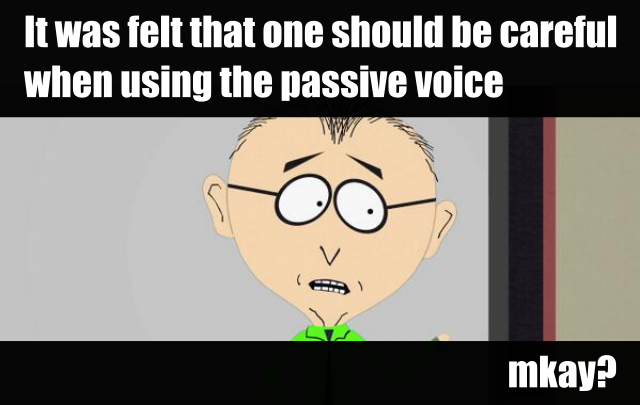In sentences with an active voice, the person or thing that performs the action (the doer) is the grammatical subject of the sentence; and the recipient of the action (the doee? ) is the object:
The researcher conducted an experiment
In sentences with a passive voice, it's the other way around: the recipient is the grammatical subject, and the doer is specified by a preposition (usually 'by'):
The experiment was conducted by the researcher
The passive voice is bad, mkay. Or least it tends to lack force and to take the speed out of a sentence. That's why most authorities caution against it:

An especially perverse passive voice arises when an active sentence without a recipient (i.e. if nothing is done to anyone) is made passive. In that case, 'it' needs to stand in for the missing recipient ('it is …'). This also happens when there strictly speaking is a recipient, but the recipient is not the subject of the passive sentence. Are you still following? Example! You often see this in academic writing, where authors happily commit crimes against humanity such as:
In the present article, it is investigated whether […]
Instead of:
Here we investigate whether […]
But what is the passive voice exactly? The examples above are clear: they are either clearly passive or clearly active. But things aren't always as clear. Consider:
I was excited by the idea of going out with her
Is this passive or active? If, like Wikipedia, you consider 'excited' to be an adjective, then I was excited is grammatically identical to, say, I was young, and the sentence is therefore active. But if you consider 'excited' to be a past participle, then the sentence is the passive version of: The idea of going out with her excited me.
In other words, it isn't always clear whether a sentence is passive or active; and neither is it always clear who the doer and the recipient are. Is being excited something that you do? Or is it something that is done to you? There's no answer, of course; it depends on context and taste. Personally, I would say that the sentence above is active, and sounds more natural than the hyperactive: The idea of going out with her excited me.
So passivity comes in degrees. Nevertheless, truly passive sentences are easy to recognize, and, unless there is a good reason to use them, are best avoided. And passive dragons with 'it' even more so.
But good reasons to use the passive voice do exist. The main reason is to emphasize the recipient, and to de-emphasize, or even omit, the doer. Consider:
The tree in our backyard was cut down
Here, it doesn't matter who cut down the tree, and the passive voice allows the doer to remain unspecified.
The passive voice can also add an element of suspense about who the doer is:
The tree in our backward was cut down—by our neighbor!
Here, there is a small pause before 'by,' before the clue of the sentence is revealed. To me, this sentence suggests a neighborly dispute about a tree, which perhaps blocked the neighbor's view; and this dispute ended with the neighbor taking her chainsaw and matters into her own hands (zeugmatize!). In contrast, the active Our neighbor cut down the tree in our backyard is more neutral; perhaps the neighbor was simply kind of enough to lend a hand.
So you can use the passive voice to de-emphasize, or even omit, the doer of an action; and in rare cases you can use it to do the opposite. But good writing does so sparingly. The doer is usually more important than the recipient, and good writing reflects this by mostly using the active voice.
One of the main faults in academic writing is to de-emphasize the I or we that are doing the experiments, making the hypotheses, drawing the conclusions, etc. Researchers often hide behind the passive voice, making themselves invisible, as though the research was done by some mystical force. As I mentioned, in the worst cases, there isn't even a recipient, and 'it' is dragged out of the pit of hell to stand in: We hypothesize becomes the inexcusable It is hypothesized.

The golden rule: Whenever you catch yourself writing a passive sentence, ask yourself: Why? If you don't know, or are in doubt, make it active. But if you do have a good reason to, then, by all means, craft a passive beauty!